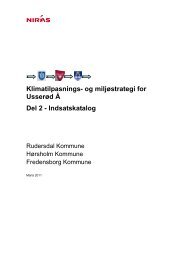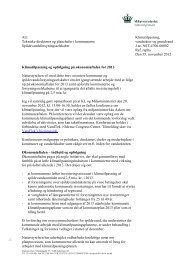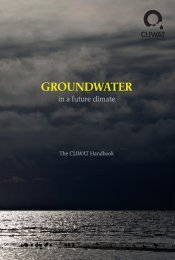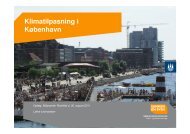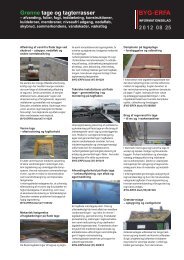Mapping climate change - barriers and opportunities for action
Mapping climate change - barriers and opportunities for action
Mapping climate change - barriers and opportunities for action
Create successful ePaper yourself
Turn your PDF publications into a flip-book with our unique Google optimized e-Paper software.
According to the government programme from 2011, Danish municipalities are to prepare<br />
municipal <strong>climate</strong> <strong>change</strong> adaptation plans over the next two years. Today, accessible <strong>and</strong> relevant<br />
tools already exist at the Danish Portal <strong>for</strong> Climate Change Adaptation (www.klimatilpasning.dk),<br />
such as the Sea Water on L<strong>and</strong> (Havv<strong>and</strong> på L<strong>and</strong>) tool, an interactive screening tool that shows the<br />
areas of Denmark that will be affected by an increase in the sea level. Another tool is Coast Planner<br />
(Kystplanlæggeren), a screening tool that shows areas that are potentially vulnerable to high-water<br />
events.<br />
Regulation<br />
The water sector is regulated on the basis of the non-profit principle <strong>and</strong> it is subject to a price cap.<br />
As a general rule, the water utility companies are able to finance the necessary investments <strong>and</strong><br />
maintenance work on the sewerage system via wastewater charges through an investment<br />
supplement to the price cap. However, with the current regulation, the water utility companies may<br />
experience liquidity problems in future. An amendment to the Statutory Order <strong>for</strong> the price cap<br />
aiming at solving this problem is currently under consultation. In addition, there may be a general<br />
need to look more closely at whether the utility companies have the necessary incentives to make<br />
the investment required in maintenance <strong>and</strong> exp<strong>and</strong>ing the sewerage system, amongst other things<br />
because, <strong>for</strong> the majority of the installations, the period of depreciation <strong>for</strong> investments in the water<br />
sector is significantly longer than the term <strong>for</strong> municipal loan guarantees.<br />
Finally, there may be assessments of whether there are alternatives outside the charges-financed<br />
area which could increase the drainage capacity of wastewater utilities cost-effectively <strong>and</strong> in a way<br />
that ensures that any amendments to the regulations are not over-exploited. The current chargesfinancing<br />
rules limit possibilities <strong>for</strong> financing such initiatives through the wastewater charge in<br />
order to ensure that water consumers only pay <strong>for</strong> the costs that actually relate to wastewater<br />
management. Cost-effective alternatives can also include water management by private consumers<br />
on their own property.<br />
Summary<br />
On the basis of the consequences of extreme downpours, regulations aimed at minimising the<br />
negative effects of flooding are being developed. As a general rule, water utility companies are able<br />
to finance the necessary investments <strong>and</strong> maintenance work on the sewerage system via wastewater<br />
charges. It would be relevant to assess whether the water utility companies have the required tools<br />
<strong>and</strong> incentives to adapt to <strong>climate</strong> <strong>change</strong> through e.g. investments in maintenance <strong>and</strong> expansion of<br />
the sewerage system. This should be seen in light of the relationship between depreciation periods<br />
<strong>and</strong> repayment periods, etc. Finally, it would be relevant to assess whether alternatives exist outside<br />
the charges-financed area to enhance the capacity <strong>for</strong> draining surface <strong>and</strong> wastewater costeffectively,<br />
including by letting individual citizens manage water on their own l<strong>and</strong>. The current<br />
charges-financing rules limit possibilities <strong>for</strong> financing such initiatives through the wastewater<br />
charge in order to ensure that water consumers only pay <strong>for</strong> the costs that actually relate to<br />
wastewater management. At the same time, pursuant to the 2011 government programme,<br />
municipalities are obliged to prepare municipal <strong>climate</strong> <strong>change</strong> adaptation plans within two years.<br />
Groundwater <strong>and</strong> water supply<br />
Important effects of <strong>climate</strong> <strong>change</strong><br />
The most important effects <strong>for</strong> the groundwater <strong>and</strong> water supply are as follows<br />
47






